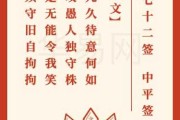本文目录导读:

在 many temples around the world, the act of consulting the spirits or deities is a deeply rooted tradition. One common practice is to toss a coin or a stick into a river near the temple and seek guidance from the spirits. This practice, known as "求签" (qiú jiǎn), is not only a way to seek divine wisdom but also a profound exercise in oneself. The question arises: should one always seek to understand the meaning of the sign, or is it sometimes better to leave it as is? This article explores the significance of interpreting or not interpreting the signs given by the spirits in temples.
求签的意义
The act of "求签" is rooted in the belief that the spirits or deities can provide guidance or insight into one's life. In many cases, the sign is interpreted as a message from the divine, offering advice or revealing truths about oneself or the world. This practice reflects the deep spiritual connection that many people have with their faith.
When one tosses a coin or stick into the river, the sign is believed to be a direct communication from the spirits. The interpretation of the sign is therefore a crucial step in seeking guidance. By understanding the sign, one can gain clarity and direction in their life. This process of interpretation is not just a matter of chance; it is a spiritual exercise that can lead to personal growth and self-realization.
解签的智慧
Interpreting the sign is a form of spiritual practice that requires wisdom and discernment. A well-intentioned interpretation can lead to profound insights and a deeper understanding of oneself and the world. For example, a sign that seems cryptic at first may reveal a deeper truth about oneself or a situation when one is ready to understand it.
The ability to interpret the sign correctly is closely tied to one's spiritual maturity. A mature soul is able to see beyond the surface meaning of the sign and understand the deeper wisdom it carries. This requires a willingness to reflect on the sign and integrate it into one's spiritual practice.
In addition, interpreting the sign can also help one to develop patience and humility. The sign is a reflection of the divine will, and it is not always easy to understand. By seeking to understand the sign, one is also seeking to understand oneself and the divine.
不解签的智慧
On the other hand, not interpreting the sign can also be a form of wisdom. Sometimes, the sign is so mysterious that it cannot be easily understood. Trying to force an interpretation can lead to frustration and confusion. In such cases, it is better to leave the sign as is, allowing it to remain a mystery.
Not interpreting the sign is also a form of respect for the divine. By not attempting to understand the sign, one shows reverence for the spirits and the divine will. This respect is an important aspect of the spiritual practice.
Moreover, not interpreting the sign can also lead to a sense of freedom. When one is not bound by the need to understand the sign, they are free to live in the present moment without being weighed down by past expectations or future anxieties.
解签与智慧
The concept of interpreting or not interpreting the sign is closely related to Buddhist philosophy. In Buddhi, the mind is a vessel for the accumulation of karma, and the act of seeking guidance is a way to purify the mind and lead it towards the path of wisdom.
The sign given by the spirits can be seen as a reflection of the nature of reality. By interpreting the sign, one is able to gain insight into the true nature of things. This is closely related to the Buddhist concept of "藏" (sangrahamana), which refers to the nature of the mind as a repository of all possibilities.
Furthermore, the act of interpreting the sign is also a form of meditation. By focusing on the sign and reflecting on its meaning, one is able to cultivate concentration and mindfulness. This is an important aspect of Buddhist practice.
In conclusion, the act of "求签" is a profound spiritual practice that can lead to personal growth and self-realization. Whether one chooses to interpret the sign or not depends on their spiritual maturity and understanding. A wise person knows when to seek understanding and when to remain open to the mystery.
By interpreting the sign, one can gain profound insights and develop their spiritual wisdom. However, it is also important to recognize the value of not interpreting the sign, as it can lead to a sense of reverence and freedom. Ultimately, the act of "求签" is a way to connect with the divine and find guidance in one's own spiritual path.
In the words of the great Buddhist teacher, "The mind is like a net; how you catch the wind depends on how you hold it." Similarly, the way one approaches the sign given by the spirits depends on their own spiritual practice and understanding. By embracing both the art of interpretation and the mystery of the sign, one can find a deeper connection with the divine and their own self.








